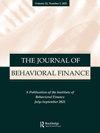实验室资产市场的回报可预测性
IF 1.7
3区 经济学
Q3 BUSINESS, FINANCE
引用次数: 0
摘要
摘要实证研究发现,零售交易的订单不平衡可以预测未来的股票收益。作者利用实验室资产市场的数据调查了这个谜题的原因,在实验室资产市场中,没有经验的受试者在单一资产市场中进行交易(SSW设计)。研究发现,实验室市场的零售订单失衡正预测了t + 1时期的收益。在缺乏内幕信息或机构投资者的实验室市场中,回报可预测性的存在表明,可预测性并不取决于私人信息或机构投资者的活动,从而减少了依赖于这两个条件的理论的支持。此外,作者还发现,当受试者更兴奋时,实验室结果的回归可预测性更强,统计意义更显著。他们用经验数据检验了这一新颖的实验室发现,并证实,当市场情绪高涨时,回报的可预测性更强。研究结果表明,收益可预测性的原因可能与投机活动有关。本文章由计算机程序翻译,如有差异,请以英文原文为准。
Return Predictability in Laboratory Asset Markets
Abstract Empirical studies find that the order imbalance of retail trades can predict future stock returns. The authors investigated the cause of the puzzle using data from the laboratory asset markets in which inexperienced subjects trade in a single asset market (SSW design). The authors found that the retail order imbalance in period t positively predicted returns in period t + 1 in laboratory markets. The existence of return predictability in laboratory markets in which insider information or institutional investors are absent suggests that the predictability is not contingent upon private information or the activities of institutional investors, thus diminishing support of theories relying on these 2 conditions. In addition, the authors found that the return predictability in lab results was stronger and more statistically significant when the subjects were more excited. They tested this novel lab finding in empirical data and confirmed that return predictability is more robust when the market sentiment is higher. The findings suggest that the cause of the return predictability is likely linked to speculative activities.
求助全文
通过发布文献求助,成功后即可免费获取论文全文。
去求助
来源期刊

Journal of Behavioral Finance
Multiple-
CiteScore
4.60
自引率
10.50%
发文量
34
期刊介绍:
In Journal of Behavioral Finance , leaders in many fields are brought together to address the implications of current work on individual and group emotion, cognition, and action for the behavior of investment markets. They include specialists in personality, social, and clinical psychology; psychiatry; organizational behavior; accounting; marketing; sociology; anthropology; behavioral economics; finance; and the multidisciplinary study of judgment and decision making. The journal will foster debate among groups who have keen insights into the behavioral patterns of markets but have not historically published in the more traditional financial and economic journals. Further, it will stimulate new interdisciplinary research and theory that will build a body of knowledge about the psychological influences on investment market fluctuations. The most obvious benefit will be a new understanding of investment markets that can greatly improve investment decision making. Another benefit will be the opportunity for behavioral scientists to expand the scope of their studies via the use of the enormous databases that document behavior in investment markets.
 求助内容:
求助内容: 应助结果提醒方式:
应助结果提醒方式:


